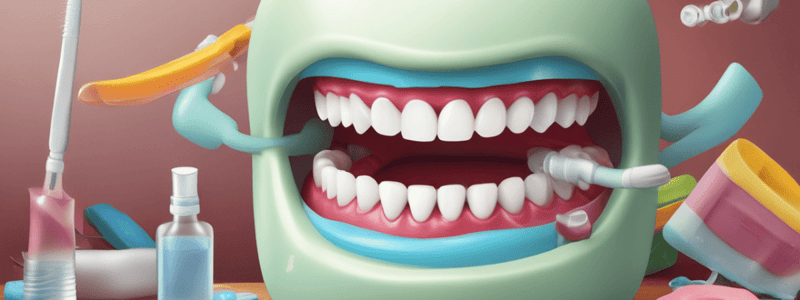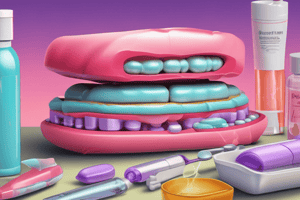Podcast
Questions and Answers
Why do soft, processed foods contribute to tooth decay?
Why do soft, processed foods contribute to tooth decay?
- Because they contain fewer vitamins and minerals
- Because they are low in sugar
- Because they are high in antioxidants
- Because they are less fibrous and cling to teeth (correct)
What is one way fruits and vegetables help with oral health?
What is one way fruits and vegetables help with oral health?
- They reduce the immune system's ability to fight off infections
- They contain high amounts of added sugar
- They mechanically clean teeth surfaces as they are chewed (correct)
- They produce acid in the mouth
Why is it beneficial to introduce fruits and vegetables early in a child's diet?
Why is it beneficial to introduce fruits and vegetables early in a child's diet?
- Because they are low in fiber
- Because they promote healthy eating habits (correct)
- Because they are high in sugar
- Because they are overly processed
What is a benefit of consuming fruits and vegetables for overall health?
What is a benefit of consuming fruits and vegetables for overall health?
What is one difference between fruits and soft, processed foods?
What is one difference between fruits and soft, processed foods?
Why do soft, processed foods cling to teeth?
Why do soft, processed foods cling to teeth?
What is a benefit of consuming fibrous fruits and vegetables for oral health?
What is a benefit of consuming fibrous fruits and vegetables for oral health?
What happens when bacteria in the mouth ferment sugar?
What happens when bacteria in the mouth ferment sugar?
What is one way fruits and vegetables support overall health?
What is one way fruits and vegetables support overall health?
Why are fruits and vegetables a healthier option than soft, processed foods?
Why are fruits and vegetables a healthier option than soft, processed foods?
Flashcards are hidden until you start studying
Study Notes
Sticky Foods and Oral Hygiene
- Sticky foods, such as sugary treats, starchy snacks, and seemingly healthy options like dried fruits, pose a persistent challenge to oral hygiene because they can adhere to teeth and gums, making them difficult to dislodge by normal chewing or saliva.
- These foods can stay stuck in teeth for hours, providing a sustained source of sugars and carbohydrates for oral bacteria to feast on, leading to acid production and potentially causing tooth decay.
Effects of Sticky Foods on Teeth
- The prolonged contact between sticky substances and teeth allows oral bacteria to metabolize the sugars, producing acid as a byproduct, which is highly detrimental to tooth enamel.
- Continuous acid exposure leads to the demineralization of the enamel, weakening it and making it more susceptible to decay.
Challenges of Removing Sticky Residues
- Regular oral hygiene practices, such as brushing and flossing, may not be enough to remove sticky food residues, especially in areas frequently missed, such as the back molars and spaces between teeth.
- These areas are particularly vulnerable to acid production, exacerbating the risk of tooth decay.
Managing Sticky Food Consumption
- Limiting the intake of sticky foods, especially between meals, can minimize the duration of acid exposure.
- Brushing and flossing soon after consuming sticky foods can help remove residues and reduce the risk of tooth decay.
- Rinsing the mouth with water or an antibacterial mouthwash can also help dislodge particles and neutralize acids.
- Regular dental check-ups are essential to ensure that any developing issues are caught and addressed early.
Cariogenic Foods
- Cariogenic foods, such as candy, soft drinks, pastries, dried fruits, cereals, bread, potato chips, ice cream, and sports drinks, promote the formation of cavities and tooth decay.
- These foods contain sugars and starches that oral bacteria metabolize, producing acids that can erode tooth enamel.
Fruits and Vegetables: A Better Option for Toddlers
- Fruits and vegetables are significantly better for toddlers than diets predominantly made up of soft processed foods.
- Four reasons why:
- High fiber content and chewing: Fruits and vegetables require more chewing, which increases saliva production, helping to wash away food particles and neutralize acids produced by bacteria.
- Reduced sugar exposure: Processed foods often contain higher amounts of added sugars, whereas fruits and vegetables have natural sugars and are less likely to cling to teeth.
- Nutritional benefits: Fruits and vegetables are packed with essential vitamins, minerals, and antioxidants that contribute to overall health, including oral health.
- Healthy eating habits: Introducing fruits and vegetables early in a child's diet promotes healthy eating habits and a preference for natural foods over processed ones.
Studying That Suits You
Use AI to generate personalized quizzes and flashcards to suit your learning preferences.




